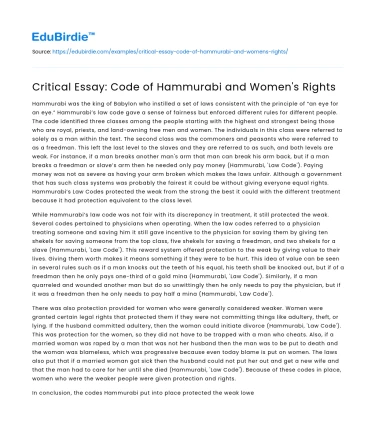Hammurabi was the king of Babylon who instilled a set of laws consistent with the principle of “an eye for an eye.” Hammurabi’s law code gave a sense of fairness but enforced different rules for different people. The code identified three classes among the people starting with the highest and strongest being those who are royal, priests, and land-owning free men and women. The individuals in this class were referred to solely as a man within the text. The second class was the commoners and peasants who were referred to as a freedman. This left the last level to the slaves and they are referred to as such, and both levels are weak. For instance, if a man breaks another man's arm that man can break his arm back, but if a man breaks a freedman or slave’s arm then he needed only pay money (Hammurabi, 'Law Code'). Paying money was not as severe as having your arm broken which makes the laws unfair. Although a government that has such class systems was probably the fairest it could be without giving everyone equal rights. Hammurabi’s Law Codes protected the weak from the strong the best it could with the different treatment because it had protection equivalent to the class level.
While Hammurabi’s law code was not fair with its discrepancy in treatment, it still protected the weak. Several codes pertained to physicians when operating. When the law codes referred to a physician treating someone and saving him it still gave incentive to the physician for saving them by giving ten shekels for saving someone from the top class, five shekels for saving a freedman, and two shekels for a slave (Hammurabi, 'Law Code'). This reward system offered protection to the weak by giving value to their lives. Giving them worth makes it means something if they were to be hurt. This idea of value can be seen in several rules such as if a man knocks out the teeth of his equal, his teeth shall be knocked out, but if of a freedman then he only pays one-third of a gold mina (Hammurabi, 'Law Code'). Similarly, if a man quarreled and wounded another man but do so unwittingly then he only needs to pay the physician, but if it was a freedman then he only needs to pay half a mina (Hammurabi, 'Law Code').
Save your time!
We can take care of your essay
- Proper editing and formatting
- Free revision, title page, and bibliography
- Flexible prices and money-back guarantee
There was also protection provided for women who were generally considered weaker. Women were granted certain legal rights that protected them if they were not committing things like adultery, theft, or lying. If the husband committed adultery, then the woman could initiate divorce (Hammurabi, 'Law Code'). This was protection for the women, so they did not have to be trapped with a man who cheats. Also, if a married woman was raped by a man that was not her husband then the man was to be put to death and the woman was blameless, which was progressive because even today blame is put on women. The laws also put that if a married woman got sick then the husband could not put her out and get a new wife and that the man had to care for her until she died (Hammurabi, 'Law Code'). Because of these codes in place, women who were the weaker people were given protection and rights.
In conclusion, the codes Hammurabi put into place protected the weak lower classes from the strong upper class by placing value on the lives of the people in the lower classes. The codes also protected the “weak” women by giving them certain rights for protection. Hammurabi felt an obligation to protect the weak because it was what the Gods told him to do.






 Stuck on your essay?
Stuck on your essay?

